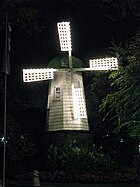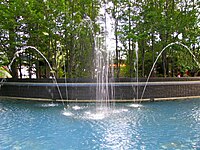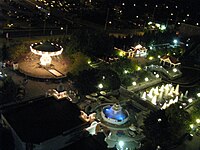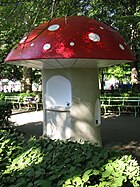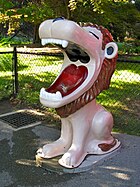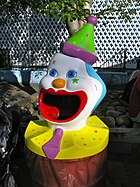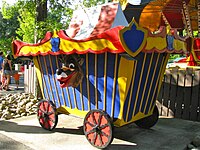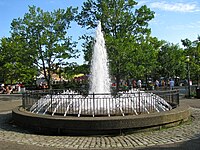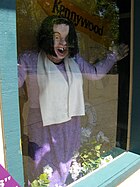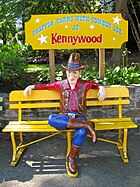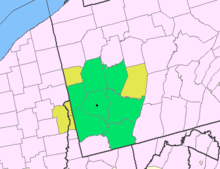Kennywood
This article needs additional citations for verification. (June 2008) |
 | |
| Location | 4800 Kennywood Boulevard, West Mifflin, Pennsylvania, United States |
|---|---|
| Opened | May 30, 1899[1][2] |
| Owner | Palace Entertainment (Parques Reunidos) (Candover Investments) |
| Slogan | "Kennywood, The Way to Unforgettable Fun", "Make a New Memory at Kennywood Park", "Around the Corner and out of This World", "America's Finest Traditional Amusement Park", "The World's Finest Traditional Amusement Park," "Kennywood's Open" |
Kennywood Park | |
| Location | West Mifflin, Pennsylvania |
| Area | 80 acres (32.4 ha) |
| Built | 1898 |
| Architect | George S. Davidson |
| NRHP reference No. | 87000824 |
| Significant dates | |
| Added to NRHP | February 27, 1987[4] |
| Designated NHLD | October 9, 1960[5] |
| Designated PHMC | August 05, 1992[3] |
| Operating season | Year-Round |
| Area | 80 acres (32.4 ha) |
| Attractions | |
| Total | 46 |
| Roller coasters | 7 |
| Water rides | 3 |
| Website | Official website |
Kennywood is an amusement park located in West Mifflin, Pennsylvania. The park first opened as a "trolley park" attraction at the end of the Mellon family's Monongahela Street Railway on May 30, 1899.[1][2] It was purchased in 1906 by F. W. Henninger and Andrew McSwigan who later formed the Kennywood Entertainment Company, which owned and operated the park as a closely held family business for over 100 years. Kennywood was purchased by California-based Palace Entertainment in 2007.[6] The amusement park features various structures and rides dating back to the early 1900s. Along with Rye Playland Park, it is one of only two amusement parks listed in the National Register of Historic Places.
Location
Kennywood is approximately 8 miles (13 km) from Downtown Pittsburgh, in West Mifflin, Pennsylvania. The park is along Pennsylvania Route 837 (Green Belt), known as Kennywood Boulevard as it passes through the borough. The closest Interstate connection is Exit 77 (Edgewood/Swissvale) on Interstate 376.[7] The Mon–Fayette Expressway will eventually go past Kennywood, which will prompt an expansion of the park when it is built.[8]
Historically, the park is on the location of the July 9, 1755 Battle of the Monongahela, where British general Edward Braddock was mortally wounded, ending his expedition to capture the French Fort Duquesne during the French and Indian War. George Washington was a colonel to Braddock, and fought at the battle before they retreated.[9] Later the land on the bluff above the Monongahela River was part of a farm owned by Anthony Kenny. Starting around the time of the American Civil War, the site was a popular picnic grove for locals, known as "Kenny's Grove".[9]
History

A tree-filled portion of a farm owned by Anthony Kenny, known as "Kenny's Grove" overlooking the Monongahela River near Pittsburgh, Pennsylvania was a popular picnic spot for local residents since the American Civil War. In 1898, the Monongahela Street Railways Company, partially owned by prominent banker Andrew Mellon, seeking to increase fare profits on the weekends, leased the land from the Kenny family in order to create a trolley park at the end of their line.[9] The company's chief engineer, George S. Davidson, designed the original layout of the park and served as its first manager. A carousel, casino hall, and dance pavilion were added in 1899. A bandstand was constructed in 1900, while the Old Mill was constructed in 1901, and the park's first roller coaster, the Figure Eight Toboggan, was added in 1902.[9][10] After less than a decade, the trolley company no longer wanted to manage the park. The standing manager, Andrew S. McSwigan, along with partners Frederick W. Henninger and A. F. Meghan, leased and operated the park as Kennywood Park Limited beginning in 1906.[9]

From its origin as a working-class picnic entertainment destination, the park grew in the first half of the twentieth century into a popular attraction that combined thrill rides with recreation venues such as swimming pools and dance halls.
Kennywood ceased to be served by streetcar when Mon Street Railways successor Pittsburgh Railways Company converted the route serving it, the lengthy #68 Duquesne-McKeesport line, to bus on September 15, 1958.
The park was designated a U.S. National Historic Landmark in 1987.[5][11]
Today, the park features a nostalgic atmosphere and is supported by a loyal fan base. As of December 2007, Kennywood Entertainment also ran Sandcastle Waterpark [3], which opened in 1989; Idlewild Park [4] near Ligonier; Story Land [5], a children's theme park in Glen, New Hampshire; and Lake Compounce [6], New England's family theme park in Bristol, Connecticut, which is the oldest continuously operating amusement park in North America.
On December 12, 2007, Kennywood Entertainment announced that it would be selling Kennywood Park, along with four other amusement parks in the Northeastern United States, to Parques Reunidos, a company based in Madrid, Spain.[6]
Kennywood now uses the slogan "America's Finest Traditional Amusement Park" as well as "Make a New Memory," although from the 1960s through the early 1990s the slogan was "The Roller Coaster Capital of the World." (a title which is now being used by Cedar Point) The property features three old wooden roller coasters still in working order, along with two newer steel coasters, the Phantom's Revenge (2001) and the Sky Rocket (2010), and one indoor coaster, the Exterminator (1999).

Through the years, the phrase "Kennywood's open!" has gained an alternate meaning and is often used in the Pittsburgh region to alert another person that the zipper on his/her pants is open.[12]
Recognition
For the past several years, Kennywood has been rated the "Favorite 'Dark Attraction Park'" by the Darkride And Funhouse Enthusiasts, or DAFE.[13]
It ranked second to Cedar Point in the category of "Favorite Park" in Theme Park Magazine's 2004 Reader's Choice Awards.[14]
Attractions

Themed areas
- Kiddieland was one of the first children's ride areas in the world, featuring all the rides in the park's diverse array of young child-specific rides in a compact area between the Auto Race and the Aero360. Rides include miniature versions of the Turtle, Wave Swinger, Phantom's Revenge, Cosmic Chaos, Whip, and Merry-Go-Round. It is located next to the edge of the cliff on the river-view side of the park. It was originally located next to the Jack Rabbit before moving to its current location in 1927.
- Lost Kennywood, which was added to the park in 1995, was built on the old sunlite pool/pay parking lot area. The area references Kennywood's long history, including its short-lived rival Luna Park (1905–1909), and also the illusion of yesteryear's dangerous rides. The area includes the Pittsburg Plunge, the Whip, the Bavarian Wave Swinger, the Exterminator, the Black Widow, and the Swing Shot. Older rides which have been removed from Lost Kennywood since its opening include the Phantom Phlyers, Roll-O-Plane, the Pitt Fall 251-foot (77 m)-drop tower ride and WipeOut. The gateway to Lost Kennywood is a one-third scale replica of Luna Park's main entrance which spells Pittsburgh with no 'H', because in 1905–1909, Pittsburgh's name was spelled that way.
- Volcano Valley was created in the park in 2003 for the addition of a new ride that year, King Kahuna. The Enterprise was re-themed as the Volcano during the transformation of this section of the park, which features the Volcano, Pirate, and cement volcanoes that are capable of spewing smoke.
Roller coasters
Kennywood has made use of the hilly Pittsburgh terrain to create coasters that wouldn't be feasible in some amusement parks. The Thunderbolt and the Jack Rabbit, both wooden coasters, place the lift chain in the middle of the ride, not at the beginning. In both cases, the car leaves the station and drops into a valley for its first hill. Phantom's Revenge uses the same valley as the Thunderbolt, where the Phantom's second drop passes through the supports of the Thunderbolt's first drop, making the second drop the longest and steepest drop in the ride.
| Ride/Year Opened | Manufacturer/Designer | Type | Description |
|---|---|---|---|
Jack Rabbit (1920) 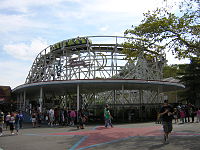
|
John A. Miller | Wooden | A wooden out and back roller coaster, one of the oldest running in the world. The Jack Rabbit is famous for its double dip, lifting riders out of their seat. It is also one of the few remaining coasters operating with only a seatbelt to restrain passengers. |
Racer (1927) 
|
John A. Miller | Wooden Moebius | A wooden racing roller coaster with a track that is looped over on itself to create the appearance of two separate, parallel tracks; the ride in fact consists of one track referred to as a moebius track. The winning side is the one that passes the black and white checkered finish line above the brake run just before the station, and is signaled by one of two red lights on either side of the operators' booth. This is one of four rides that use a bell to signal its start and stop. |
Thunderbolt (1968) 
|
Andy Vettel Sr./John A. Miller | Wooden | A wooden roller coaster that resulted from a renovation of the Pippin (1924-1967). It was ranked the Ultimate Roller Coaster and King of Coasters by the New York Times in 1974. The coaster is unusual in that the lift hill isn't immediately out of the station. Instead, the lift hill is in the middle of the ride. |
Exterminator (1999) 
|
Reverchon | Spinning Wild Mouse | It is a roller coaster and a dark ride. The coaster has heavily themed scenery, even in the queue. |
Phantom's Revenge (2001) 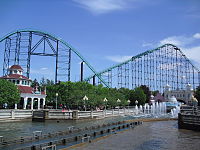
|
D. H. Morgan/Arrow Dynamics | Steel Hypercoaster | A steel coaster that resulted from renovating the 1991 Steel Phantom. After the 2000 season, the coaster was heavily modified by D. H. Morgan, including the removal of all inversions due to complaints of uncomfortable shoulder restraints. The ride is unusual because the second drop is longer than the first. Although the first hill is only 160 feet (49 m) tall, it is still considered a hyper-coaster because its maximum drop exceeds a 200 feet (61 m) change in elevation. |
Sky Rocket (2010) 
|
Premier Rides | Steel Launched coaster. | A steel coaster and Kennywood's newest coaster. It is the first coaster at the park to feature inversions since Steel Phantom. The trains feature waist and shin restraints rather than traditional over the shoulder restraints. |
Flat rides
| Ride/Year Opened | Manufacturer/Designer | Model | Description |
|---|---|---|---|
Aero 360 (2000) 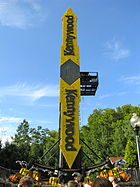 |
Zamperla | Hawk 48 | This ride is a modern, open-air version of the park's old Ranger ride and features the Kennywood arrows on the rotating arms. Seated on inverted seats with legs freely dangling, riders swing back and forth – higher and higher with each pendulum motion. As momentum builds, the ride culminates by spinning riders the full 360 degrees. |
Auto Race (1930) 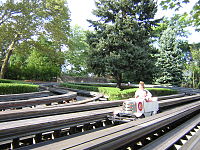
|
Traver Engineering | Auto Train | Also known by several veterans as the Auto Ride, this ride is the last of its kind and was designed by Harry Traver of the Traver Engineering Company. Electric cars run through a trough-like wooden track that twists and turns. When the ride opened in 1930, it had several small hills placed in the track, but these were soon removed to avoid rear-end collisions that were caused when cars could not get up and over them on rainy days. Again to avoid rear-end collisions, the ride was fully computer automated and the cars slowed down for the 2014 season. |
Bayern Kurve (2009) 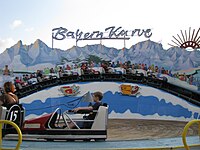
|
Anton Schwarzkopf | Bayern Kurve | Riders sit in one of the sixteen cars that travel at a high-speed around a circular, single-hilled track. Riders start in an upright position and as the cars pick up speed, they tilt inward toward the center of the ride. This ride is also known for its loud air horn which, along with the sound of the moving vehicles, is reminiscent of a diesel train. A popular ride since 1968, this is the third Bayern Kurve that the park has installed. |
Black Widow (2012) 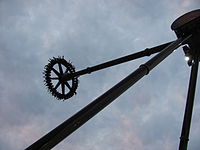
|
Zamperla | Giant Discovery | The ride seats 40 people and swings riders back and forth like a pendulum, reaching speeds up to 68 mph. The ride structure stands at 90 ft and at the peak of the pendulum's swing height riders will hang 146 ft off the ground. The ride replaced the Pittfall drop tower ride. |
Cosmic Chaos (2007) 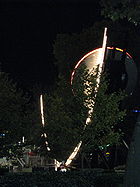 |
Zamperla | Mega Disk'O | The ride seats 24 people on a giant disk. Riders sit upon motorcycle-like pedestal seats with back restraints. Arms and legs are free from restraint and the passenger faces outward. To a top height of 50 ft, the disk begins its untamed flight along the 120 ft concave track while its passengers spin around in circle. |
Gran Prix (1973) 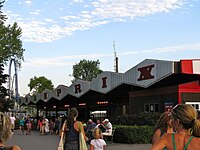
|
Reverchon | Bumper Cars | The ride was added as a replacement for the Scooters bumper car ride and eliminated the need for a center divider and one way traffic. It runs 40 two-passenger cars, one of which, #31, is painted black and gold in honor of Mike Logan of the Pittsburgh Steelers football team, who mentioned the park after the Steelers won Super Bowl XL. It is one of four rides at Kennywood with a ride start/stop bell and its bell was actually salvaged from the Scooters building. Riders steer their cars in any direction across the metal rectangular floor bumping other cars out of their way. |
Kangaroo (1962) 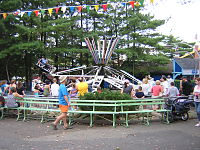
|
John Norman Bartlett | Flying Coaster | The last ride of its kind; purchased in 1962. During the ride, eight cars travel a circular track with a single steep hill. After "bouncing" off the top of the hill, the cars then make a slow descent in midair back down to the track, giving each guest the sensation of flying. Its resemblance of a Kangaroo's leap is what inspired its name. |
Grand Carousel (1927) 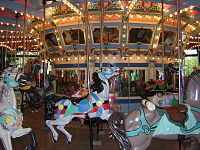
|
William H. Dentzel | Carousel | Referred to simply as the merry go round by many, the Grand Carousel is a Pittsburgh History and Landmarks Foundation Historic Landmark and is Kennywood's third and largest carousel. Originally commissioned by the U.S. Government for the 1926 Philadelphia Sesqui-Centennial Exposition, it was not completed in time and was purchased by Kennywood. It is also the last carousel that was ever built by William Dentzel. There are 50 jumping and 14 stationary horses. The only two non-horse animals featured on the ride are the tiger and the lion. It is one of four rides at Kennywood with a ride start/stop bell that dates back to the origin of the ride and features over 1500 lights.
Music is provided by a 1916 Wurlitzer style #153 Military Band Organ, which is the oldest of its kind in existence, and possibly the first of more than 140 style #153 organs built between 1916 and 1936. During Phantom Fright Nights, the carousel is filled with fog and various figures are placed on the outer row of animals. During Holiday Lights, the carousel is decorated in wreaths and garland, with red and green lights, and Christmas music playing on the band organ. |
Musik Express (1987) 
|
Mack Rides | Music Express | Musik Express is a quick circular ride that travels clockwise around an undulating track. It has a white/red loading/running lighting theme, respectively. The ride has a 1960s/1970s rock theme to it with yellow and green being the theme colors of the ride. During Phantom Fright Nights, Halloween themed music is played. |
Paratrooper (1959) 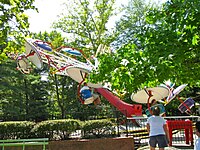
|
Frank Hrubetz | Paratrooper | Originally called the Skydiver, this ride has ten umbrella-covered cars which rotate counter-clockwise on a long arm. During the ride, the hydraulic-powered arm the cars are mounted to raises to a 45 degree angle. |
Pirate (1982) 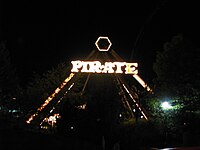 |
Huss | Pirate Boat | This is a large pirate-themed boat suspended from a giant "A" frame structure mounted to a trailer. The trailer is hidden behind a retaining wall surrounded by landscaping. The boat swings back and forth until it achieves a height of 60 feet (18 m) and is at a 75-degree angle with its initial resting position, giving riders the sensation of weightlessness. Originally the "helm" of the ship was facing the road, but after Kennywood renovated the ride under Huss's supervision, the direction of the boat was flipped so that the "helm' now faces Noah's Ark. |
Swing Shot (2006) 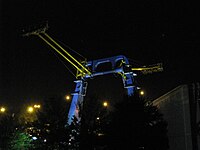
|
S&S Worldwide | Air-Launched Screamin' Swing | One of the first 32 passenger models of the S&S Screamin' Swing to debut. It is a giant swing that swings riders back and forth, reaching a height of 90 feet (27 m) at a 120 degree angle and reaching speeds of 50 mph (80 km/h). This ride stands where the WipeOut once stood. Initially the ride was plagued with downtime due to the plastic air chambers leaking. Since installing the redesigned steel air tanks, the ride has been more reliable. |
Turtle (1927) 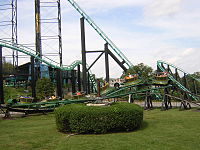
|
Traver Engineering Company | Tumble Bug | This is a bumpy-track or undulating ride with six cars that travel counter-clockwise on a circular track over a series of three hills and dips. Originally called the Tumble Bug, the ride featured bug-themed cars until it received new turtle-like exteriors. The Turtle is one of only two operating rides of its kind and the only known Turtle variant of the Tumble Bug left in existence. |
Volcano (1978) 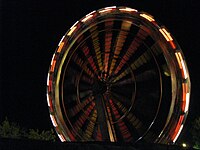
|
Huss | Enterprise | This ride was originally called the Enterprise until the addition of the Volcano Valley themed area. As the Enterprise, the loading platform was surrounded by a blue railing and was raised by a retaining wall that was surrounded by shrubbery. As the Volcano, the shrubbery has been replaced with a mountain landscape that covers the original retaining wall and railing. It has 20 swinging gondolas, which travel in a circular clockwise motion on a large wheel. Once it achieves a fast enough speed, the wheel raises riders to a 90-degree angle and spins the riders upside down. In the past, this ride featured eruption-themed special effects including sound, fog, and lighting. Only the fog effect is still operational and is almost exclusively used during Phantom Fright Nights. |
Wave Swinger (1984) 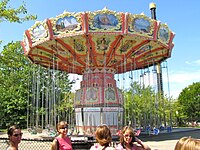
|
Zierer | Wave Swinger 48 | This ride is a trailer-mounted wicker swing ride with the trailer placed in a pit to make the ride flush to the ground and ADA accessible, unlike the usual trailer setup. It has a white/red loading/running lighting theme, respectively, and features a painting in the center of a decorative molding on each exterior panel. |
Whip (1919) 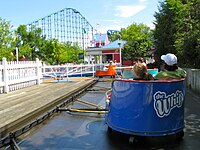
|
W.F. Mangels | 16 Car Whip | It is the oldest flat ride in the park and the last operating 16 car whip. The ride's 16 cars travel along an oblong track and "whip" as they go around the bend at either end. The Whip was relocated from the Log Jammer Pavilion to Lost Kennywood in 1995 and is one of four rides in Kennywood with a ride start/stop bell that dates back to the origin of the ride. In 2002, a park guest was killed when the ride's pavilion collapsed during a microburst. The pavilion has not been rebuilt, but replaced with a white wooden fence and surrounded by flagpoles. The openness of the ride makes it unique as most Whips are sheltered under pavilions. |
Upcharge attractions
| Ride/Year Opened | Manufacturer/Designer | Model | Description |
|---|---|---|---|
| Skycoaster (1994) | Sky Fun 1 | Skycoaster | A 180 feet (55 m) tall giant swing, allowing one to three riders at a time to free-fall approximately 75 mph (121 km/h) above the park's lagoon. This is the first Skycoaster model to be permanently installed in an amusement park. When the Skycoaster opened, it was the world's tallest version of this ride.[citation needed] This ride requires an extra fee. |
| Paddle Boats (1981) | Pedal Boats | The park's only remaining human-powered attraction. Riders paddle through the park's lagoon in any path they choose. This ride requires an extra fee. |
Dark rides
| Ride/Year Opened | Manufacturer/Designer | Model | Description |
|---|---|---|---|
Old Mill (1901)/Garfield's Nightmare (2004) 
|
Halloween Productions (scenes)/Kennywood Park (ride) | Old Mill | A dark ride in bright 3D fluorescent colors under black light. The ride scenes feature characters from the Garfield comic strip and cartoons. This is the oldest ride at Kennywood, originally constructed in 1901 though it has gone through numerous major theme and structural changes throughout its existence. The scenes inside this vintage dark attraction have featured "gorgeous grottos" from around the world including Hawaii and Australia. Prior to 2004, this attraction featured scenery of a mine haunted by ghosts, ghouls, and skeletons, as well as three outdoor scenes. In 2004 all scenes became enclosed to ensure a continuous 3D blacklight effect. Various names have accompanied the different themes over the years, including the "Panama Canal", "Hardheaded Harold's Horrendously Humorous Haunted Hideaway", and simply and most significantly, the "Old Mill". |
Ghostwood Estate (2008)  |
Halloween Productions/ETF Ride Systems | Trackless Interactive Dark ride | Riders begin by standing in a "library/study" room when Lord Kenneth Ghostwood (the owner of the estate) literally forces himself out of a picture frame. He informs riders of the spirits and how you will be able to drive them from his home so that he may regain his solitude. Each rider then walks up a flight of stairs and approaches the trackless "Ghost Buggies". Each guest is provided with a "Ghost Blaster" to help them eliminate the ghosts. The ride features animatronics, props, elaborate sets, and computer-generated animation. Guests compete with each other by shooting laser blasters at targets which activate different props. Each prop activated adds to your score, shown on a display in each car. |
| 4-D Theater (2015) | SimEx Iwerks | 4-D Theater | A traditional 4-D Theater housed in what was once the park's Playdium Arcade building. During the regular season it features "Ice Age: No Time for Nuts". During Phantom Fright Nights the movie is changed to a compilation of Friday the 13th films. For Christmas, an abbreviated version of "The Polar Express" is shown. There is an air conditioned waiting room, and a gift shop attached. |
Noah's Ark (1936) 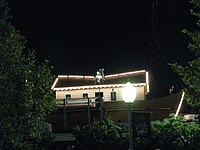
|
Herbert Paul Schmeck of the Philadelphia Toboggan Company | Noah's Ark | A walk-through "dark" attraction. Patrons walk through an ark recreating Noah's attempt at bringing animals aboard. This ride, the last operating of its kind in the world, was remodeled in 1996. During the remodeling, the Ark was entirely rebuilt due to structural problems with the original "boat." Instead of entering through a whale's mouth, patrons boarded an old industrial service elevator that provided the effect of rising, then crashing to the ground. Part of the re-theming of the ride included props meant to appear like ancient artifacts that were found below the Ark. One popular classic gag, the shaker boards, still remains. In the winter of 2015-16, the Ark was entirely remodeled to its pre-1996 state, including the famed whale's mouth entrance. Older gags that were removed in the 1996 renovation of the Ark that were re-added include air jets that were previously used to blow air up women's skirts, but now are simply used to catch guests off-guard. |
Water rides
| Ride/Year Opened | Manufacturer/Designer | Model | Description |
|---|---|---|---|
Log Jammer (1975) 
|
Arrow Dynamics | Log Flume | A fiberglass log flume water ride and a water roller coaster, which runs through the wooded area in the back of the park. It was the park's first multimillion-dollar project, built in 1975 and consisting of two lifts, a spillway that is 27 feet (8.2 m) high, and a 53-foot (16 m) high chute. |
Pittsburg Plunge (1995) 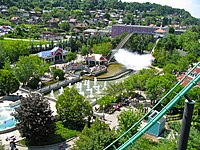
|
Hopkins Rides | Shoot the Chute | The centerpiece attraction in Lost Kennywood, this is a Shoot-the-Chute ride named for the brief period in the 1890s when Pittsburgh dropped the "h" from its name. It runs with two 20-passenger boats at a time that are designed to look like the shoot-the-chutes boats of old amusement parks. This ride can soak both the passengers and nearby onlookers with water. |
Raging Rapids (1985) 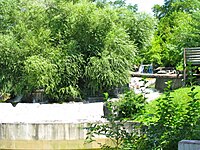
|
Intamin | River Rapids Ride | This ride was opened in 1985 and simulates a white-water rafting trip through canyons and beneath waterfalls. Three pumps are constantly filling the cement trough with 93,000 gallons of water each minute. During the first season, the first holding pool had an operating wave machine. Since 1986, wooden guide rails have sent rafts continuously through the former wave pool without stoppage. The gates at the exit of the pool are constantly held open and the wave machine is still visible, but deactivated. Also, shortly before the lift at the end of the ride there used to be a figure of a man aiming a water gun at passengers. This effect is no longer part of the ride. |
Transportation rides
| Ride/Year Opened | Manufacturer/Designer | Type | Description |
|---|---|---|---|
Kenny's Parkway (1996) 
|
CTEC Inc. | Chairlift | This is the only ride on the list of attractions located outside the park gates. It is a chairlift meant to carry guests between the park entrance and the uppermost parking lot, while providing an aerial view of the park below. It operates seasonally based on crowd levels. |
Olde Kennywood Railroad (1945) 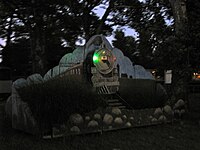
|
Miniature Train | A 3 ft (914 mm) narrow gauge[15] train ride along the top of the cliff at the rear of the park with various displays and a recording that tells about park history (prior to the 2009 season, it also told Western Pennsylvania history). The locomotives are from the 1939 New York World's Fair, have a gasoline-powered engine, and were installed in the park in 1945. The crossing sign, tunnel, and Raging Rapids Overlook were removed in 2012. The rocking train, originally featured on the roof of the station, was rebuilt in 2013. |
Kiddieland
| Ride/Year Opened | Manufacturer/Designer | Description |
|---|---|---|
| Crazy Trolley (2001) | Zamperla | Added in 2001, this ride kicked off a rehabilitation and expansion project for Kiddieland. Placed on a new midway that replaced the Safety City truck ride, this is a miniature version of the park’s former Flying Carpet ride. It is themed to the Kennywood trolley that leads the Fall Fantasy parades and roams the streets of Pittsburgh (a new bus in different colors was purchased in 2008). Adults may ride. |
| Dizzy Dynamo (1970) | San Antonio Roller Works | A unique ride, in which riders sit in one of eight cars mounted to a circular platform. As the platform begins to spin, so does each individual car, in alternating directions. Finally, the whole ride tilts over. This ride has an umbrella over top of it as well, and adults are allowed to ride. Originally named the Mini Bouncer. |
| Elephant Parade (1987) | Zamperla | A ride reminiscent of Disney's iconic Dumbo the Flying Elephant, which allows children to fly an elephant using a lever to control the height. Elephant Parade spins in the clockwise direction. |
| Kenny's Karousel (1924) | W.F. Mangels | It is one of Kiddieland's original rides. This miniature merry-go-round actually pre-dates the park's full sized version. It was refurbished for the 2009 season. |
| Lil' Phantom (1996) | Molina & Sons | The park’s kiddie coaster. Added in 1996, this is a modern coaster in the style of classic coasters manufactured by Allan Herschell. The ride was rehabbed, overhauled, and rebuilt for the 2007 season. Adults can ride. |
| Orbiter (1982) | Zamperla | On this ride, children ride around in a circle in either a helicopter or a Transformer-esque robot. The ride lifts and tilts as it operates. Originally went by the manufacturer's name of "Mini Enterprise." |
| Pounce Bounce (2002) | Zamperla | Kiddieland’s expansion was continued with the addition of this ride, a miniature of the Pitt Fall located in the center of the area where ornamental structures once stood. As its name suggests, the car gently bounces up and down the tower. The tower is themed to look like cheese, and mice appear on the sides. Originally it had a Garfield statue mounted at the top, but that has since been removed. Adults can ride. |
| Red Baron (1979) | Chance | A common kiddie ride, loosely based on the iconic real-life story of World War I pilot Manfred von Richthofen. On this ride, children pilot a plane in a circle, using a lever to control the height. Red Baron spins in the counter-clockwise direction. |
| S. S. Kenny (2007) | Zamperla | The most recent addition to Kiddieland, added in 2007. This ride is a miniature version of the Cosmic Chaos, which was added to the park the same year. As the colorful boat vehicle goes back and forth on a U-shaped ramp, the boat spins. This ride replaced the Kiddieland Magic Show after one season of operation, which itself replaced the Kiddie Cadillac ride. A statue of Kenny Kangaroo, the park’s mascot, wearing a sailor suit stands in front of the ride. Adults can ride. |
| Steel City Choppers (1974) | San Antonio Roller Works | This ride lets children ride around in a circle on miniature Honda motorcycles. A large umbrella covers the ride. |
| Turtle Chase (1950)[16] | R. E. Chambers | A kiddie version of the Turtle ride. While Kennywood's Turtle is one of only two in operation, there are many examples of the kiddie version to be found throughout the United States. Until Kiddieland’s expansion, this ride was located next to the Dizzy Dynamo. Adults are allowed to ride. |
| Wacky Wheel (1924) | W.F. Magnels | One of the first four kiddie rides installed, this miniature ferris wheel ride has had its cars replaced, but the ride is much like it has been since its opening. Originally named simply the Kiddie Ferris Wheel. |
| Whippersnapper (1985) | W.F. Magnels | A kiddie version of the park's Whip ride. A kiddie whip has been in place in Kiddieland for many years, although this one was purchased in 1985 from a park in Oregon to replace the original ride lost in a 1975 fire. |
| Whirlwind (1984) | Zamperla | A kiddie version of the Wave Swinger, although this ride does not lift or undulate. Originally named Kiddie Swings. |
Former attractions
| Ride/Years in Operation | Manufacturer/Designer | Type/Model | Description |
|---|---|---|---|
| Flying Carpet (1988–2006) | Zierer | Flying Carpet | Formerly located where the Cosmic Chaos is now, this was a high-speed ride that begins by rocking back and forth until the momentum rotates it right over the top. After a stop at the top, riders would be sent in the opposite direction. It was removed at the end of the 2006 season after a failed overhaul to increase reliability and decrease maintenance. It was donated to a non-profit amusement park in Costa Rica. |
| Ghost Ship (1967–1975) | Bill Tracy | Dark Ride | The Ghost Ship was the final theme of the dark ride located in 1899 Dance Pavilion building. In the early part of the 1975 season, The Ghost Ship burned to the ground due to faulty wiring. Fire departments from Munhall and West Mifflin pumped the water from the Kennywood lagoon to extinguish the fire. The Ghost Ship stood next to the Kiddieland entrance. |
| Gold Rusher (1981–2007) | Maurice Ayers | Dark Ride | Originally designed with a spiral lift taking the cars from the station on the ground level to the show scenes on the second floor, the station was rebuilt above the midway where is could be reached by stairs next to the Raging Rapids. This was done to eliminate the problems experienced with the lift. It was removed during the 2007 season to make way for Ghostwood Estate. Props from the Gold Rusher are used as part of Death Valley during Phantom Fright Nights as well as during Idlewild Park's Hallowboo!. The ride system was originally intended to be donated to the same park as the Flying Carpet, but the offer was turned down and it was eventually sold on eBay. |
| King Kahuna (2003–2009) | Huss | Top Spin | The ride consists of a gondola attached to two arms. The arms rotate in a circle while the platform flips riders upside down. The ride was built with jets of water that originally sprayed the riders as it spun, but after guest complaints and mold problems resulting in the replacement of the seat padding, the use of the spraying effect was discontinued leaving the fountain strictly ornamental. The ride was sold to the same non-profit park in Costa Rica to which the Flying Carpet was donated. |
| Pitt Fall (1997–2011) | Intamin | 2nd Generation Freefall | A 251 ft (76 m) drop tower that was the world's tallest drop tower upon opening. This ride was sold to an undisclosed new owner outside of the United States and replaced by the Black Widow. |
Turnpike (1966–2009) 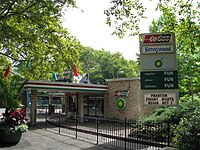
|
Arrow Dynamics/ Morgan | Electric Cars | An antique car ride formerly located right at the front of the park. This attraction originally debuted with gasoline powered cars and was sponsored by Gulf Oil. However, in 1987 these cars were removed and replaced with electric cars manufactured by Morgan. When it was created, it was a major investment for the park because the tracks could not be removed and the park owners did not yet own the land the park was built on. The price of gas at the Turnpike's gas station was read as "FUN", no matter what grade of fuel. It was removed in 2009, though the park stated in an official announcement that plans are underway to bring back the Turnpike within the next few seasons. The Sky Rocket is in its place. |
| WipeOut (1993–2008) | Chance | WipeOut | In 1993, it temporarily replaced the Enterprise (now Volcano) while it was being rehabbed. In 1994, it was a similar placeholder for the Wave Swinger which was being rehabbed for its move to Lost Kennywood and ultimately replaced by the Kennyville Stage. Then in 1996, the ride found its first permanent home by the entrance to Lost Kennywood, between the Musik Express and Wave Swinger. In 2005, the Wipeout was transplanted one final time to the current location of the Bayern Kurve to make way for the installation of the Swingshot. Originally the Kurve was to be rehabbed over the winter, but due to issues with obtaining parts, the WipeOut was installed at its location and the Kurve was removed. 2008 would be the last season for the WipeOut since the Bayern Kurve was finally done with its lengthy overhaul and reinstalled at its former location for the 2009 season. The WipeOut was moved to Lake Compounce where it is currently operating in the location of the park's former Music Express. |
Landmarks
Entertainment
- Entertainment is a focal point of Kennywood. Strolling musicians, live shows, and costumed characters are part of Kennywood's history. For the park's 100th anniversary in 1998, the park had side shows, magicians, and other events in their "centennial midway." During the 2008 season, the Kennyville Stage offered an act by Jason Pipatone – Master Entertainer as well as all day viewing of "Kenny TV", a closed circuit TV network displaying various videos and trivia. "Kenny TV" was at one time viewed at many other locations throughout the park, but the project was later abandoned and eventually removed. The Scheer's Lumberjack Show had a one-year run in 2008 replacing the "Pirates of Kenny Cove" high-dive show. In 2009, this location featured a show called Maximum Velocity, a BMX stunt show based on audience participation. The park also has strolling musicians and roaming mascots including the park's mascot, Kenny Kangaroo, who debuted in the early 1970s. From 2001 up through the end of 2008, the comic characters Garfield and Odie also could be found at the park.
Nationality days
- Nationality Days are several annual events, each spotlighting a different local culture. These include, but are not limited to, Irish Day, Greek Day, Serbian Day, Croatian Day, Polish Day, Slovak Day, Hungarian Day, and Italian Day. On these days some of the park's many picnic pavilions will be in use for entertainers of the particular day's nationality, including ethnic dancers.
Phantom Fright Nights
Phantom Fright Nights[17] is a Halloween event held at Kennywood on Friday and Saturday nights during the month of October. The park traditionally opened at seven in the evening and closes at one in the morning. In 2015 the hours were changed to six until midnight. The event began in 2002, though the concept of theming an amusement park for Halloween is not new. "Phantom Fright Nights" received third place in the Golden Ticket Awards for best Halloween event in 2007.
Labor Day traditionally marked the end of the season and the park would shut down until the spring. In 2002, Kennywood decided to break the long-standing tradition and turn almost half of the park into a giant Halloween extravaganza. The park's initial trial of Phantom Fright Nights in 2002 consisted of four traditional haunted houses, with only a few rides and roller coasters in operation. Despite the relatively limited scope of the opening year, the experiment proved to be a success, and new areas of the park and rides are opened for the festivities every year. In 2004 Kennywood debuted Gory Park, a haunted zone in Lost Kennywood. The following year, 2005, the park managed to have 3/4 of the rides and attractions operable due to high demand and record-breaking crowds. The park has reported attendance greater for one Fright Night than they have on a good normal operating day.
In the spirit of Halloween season, the park itself is given a complete make-over, with costumed actors roaming the paths, spooky music filling the air, and fog blanketing the park and every light bulb in the park is changed to a different color—even the restroom windows are covered in colored films. The merry-go-round horse normally found in the fountain by the entrance is replaced by a giant Phantom-like figure with glowing red eyes hovering over bubbling red blood (dyed water). In some places sheets are hung up and classic horror movies are played, such as the original "House on Haunted Hill". Several areas of the park, including Kiddieland and Lost Kennywood, are turned into open-air haunted attractions. Other buildings, such as the Penny Arcade and the Parkside Terrace Cafe, are converted into more traditional haunted houses. Some rides are given entirely new lighting and fog effects including strobes and blacklights, or in the Exterminator's case, an absolute absence of light. In the case of the Carousel and Müsik-Express, Halloween-themed music is all that is played. Even the entrance tunnel is affected; a great amount of fog is pumped into the passageway and chainsaw-wielding characters stalk unsuspecting guests as they enter. These ghouls are also found throughout the park when least expected.
Kennywood discourages children under the age of thirteen from attending the park during Phantom Fright Nights as the atmosphere may be too intense for some younger children, but letting children attend is solely at the discretion of parents or guardians. Many children go to Fright Nights anyway, even with the suggestion since Kennywood will admit attendees of any age.
Haunted attractions
Indoor Haunts
- Villa of the Vampire in the Penny Arcade
- Mortem Manor in the Parkside Cafe
- The Haunted Ark in Noah's Ark
- BIOFEAR in the former Whip Pavilion (Pavilion 23)
Outdoor Haunts
- Kennyville Cemetery in the grassy Dancing Waters/Gazebo area
- Dark Shadows in the back of Kiddieland
- Voodoo Bayou in the Raging Rapids trough
Haunted Midways
- Gory Park in Lost Kennywood
- Death Valley Haunted Ghost Town in front of and leading up to Ghostwood Estate
- Fear Festival surrounding the area usually occupied by the George Washington statue
Past/Changed Haunts
- Creeper's Crypt in the Penny Arcade
- Fort Despair behind the Star Refreshment stand
- Terror Vision in 3-D in the former Whip Pavilion (Pavilion 23)
- Fear Festival was part of Gory Park for its first year.
- Dark Shadows once was located near Pavilion 5.
- Captain Skully's Curse In 3D in the former Whip Pavilion (Pavilion 23)
Kennywood in the media
Kennywood's world-renowned reputation and nationwide popularity has led to its mention and appearance in many forms of media, including TV shows, movies, books, records, and has even warranted a reason to film a documentary about the park's history.
Television
- Kennywood was mentioned in an episode of CSI: Crime Scene Investigation entitled "Turn of the Screws", which dealt with a Las Vegas roller coaster derailment. CSI Supervisor Gil Grissom, who is a roller coaster enthusiast, tells the park engineer that he holds the marathon riding record on the Steel Phantom in Kennywood Park, Pennsylvania.
- Kennywood was also mentioned on an episode of Without a Trace. They showed the park, but the name of it was not the same. It had the famous Steel Phantom in the park also.
- After the Pittsburgh Steelers won Super Bowl XL in 2006, Steelers safety Mike Logan, a native of McKeesport, Pennsylvania, near Kennywood, made a humorous riff on the "I'm going to Disney World!" advertising campaign usually associated with the Super Bowl, saying, "Forget Disney World, I want them to open up Kennywood!"
- Singer/Actor Micky Dolenz, former drummer for The Monkees, often fondly tells audiences at his live shows that Kennywood was the location of his first ever public appearance. He appeared at Kennywood with his elephant in the 1950s when he was known as Circus Boy. The television series featured Micky as Corky, a boy who grows up on the road in a circus.
- A scene of Kennywood can be seen in the Nickelodeon TV program Zoey 101 (ep. 62: "Roller Coaster") with a sign reading "Spine Twister" on the lift hill of the Phantom's Revenge.
Movies
- In the 1993 film Striking Distance, a poster for Kennywood's Fraternal Order of Police picnic day is visible inside a Pittsburgh Police station.
- Footage of Kennywood's Musik Express was shown in the beginning of the 1994 film Only You. The Wonder Wheel was also featured in this movie.
- The 2009 film Adventureland was filmed at Kennywood.
Literature
- Kennywood also served as the inspiration for "Joyland Park" in LJ Smith's teen horror novel The Forbidden Game: The Kill.
Song
- In 1899 Kennywood commissioned the "Kennywood Park Waltz" and it was popular around the turn on the century. Kennywood would sell the sheet music in the park. It was composed by Margaretha Scandroll. It has only been professionally recorded once for the 2007 documentary "Welcome Back Riders". It was performed by the Bulgarian Tosheff Piano Duo.
- In 1987[18] Rock 'n roll singer Freddy Cannon recorded a slightly remade version of his 1962 hit "Palisades Park" called "Kennywood Park", featuring attractions at Kennywood [7]. The song was released on a limited-edition 45 vinyl pressing and sold as a $1.99 fundraising item for Pittsburgh's Children's Hospital through the now-defunct National Record Mart. The record is considered by some to be a collector's item today.[citation needed]
Documentary
- On September 28, 1988, the local PBS station, WQED, first aired Kennywood Memories, a one-hour documentary about Kennywood. Rick Sebak narrated. Though twenty years later, many of the rides talked about are gone, the historic information about the park is still quite relevant.
- Kennywood was featured in the 2007 documentary "Welcome Back Riders".
Attraction timeline
- 2017
- 2016: Noah's Ark remodeled
- 2015: 4-D Theater replaces Playdium Arcade
- 2012: Black Widow ride replaces Pitt Fall[19]
- 2011: Kandy Kaleidoscope is remodeled, Parkside Cafe is remodeled and becomes the park's first air-conditioned food service location, Kiddieland restrooms are rebuilt to include a refreshment stand, Star Refreshment stand is renovated, Merry-Go-Round horses are refurbished, Pitt Fall removed, Holiday Lights debut, Wurlitzer Band Organ on Merry-Go-Round is completely rebuilt.
- 2010: Sky Rocket, a new Steel Roller Coaster,[20] Turnpike Removed and placed in storage with intent to be reinstalled. King Kahuna removed.
- 2009: Bayern Kurve****,[21] WipeOut removed, original Phantom drop and second hill retracked.
- 2008: Ghostwood Estate,[22] new Kiddieland games building.
- 2007: Cosmic Chaos, SS Kenny, roofing over the escalators to lot 2, Gold Rusher removed.
- 2006: Swing Shot
- 2005: New front gate structures built, Bayern Kurve*** and Swing Around removed, Merry-Go-Round undergoes a complete overhaul and is rebuilt, Wurlitzer Band Organ is repainted
- 2004: Garfield's Nightmare (theme change from Old Mill)
- 2003: King Kahuna (formerly Top Spin from Lake Compounce, removed 2010), Ham-on-Rye (removed in 2005), Volcano Valley themed area, Volcano (theme change from Enterprise), Roll-O-Plane removed, Miniature Golf removed
- 2002: Garfield's Pounce Bounce, Phantom Fright Nights debut
- 2001: Phantom's Revenge (rebuilt from Steel Phantom), Crazy Trolley
- 2000: Aero 360, Dancing Waters relocated across from Grand Prix, Garfield and Odie added as park mascots
- 1999: Exterminator, Wonder Wheel removed.
- 1998: Kennywood celebrates its 100th anniversary, Centennial Midway (one season), Le Cachot demolished
- 1997: Pitt Fall (Removed in 2011)
- 1996: Lil Phantom (Kiddieland), Kenny's Parkway, Noah's Ark remodeled, Phantom Phlyer removed
- 1995: LOST KENNYWOOD expansion in former location of Sunlite Swimming Pool – Pittsburg Plunge, Phantom Phlyer (Removed in 1996, moved to Lake Compounce), Roll-O-Plane*** (removed in 2003), Whip and Wave Swinger moved to Lost Kennywood, Great Balloon Race removed
- 1994: SkyCoaster, Bayern Kurve*** (Removed in 2005)
- 1993: WipeOut (removed 2009, relocated to Lake Compounce)
- 1992: Tri-Star (lasts only one season, moved to Idlewild in 1998), Old Mill (Haunted Hideaway renamed)
- 1991: Steel Phantom (quickly tops top 10 list, rebuilt as Phantom's Revenge in 2001), Wurlitzer Band Organ undergoes extensive repairs
- 1990: Great Balloon Race (removed in 1995, moved to Idlewild), Laser Loop removed, original facade on Racer loading platform restored
- 1989: Swing Around** (removed in 2005), Monster removed
- 1988: Flying Carpet (removed in 2006), Rotor*** (removed in 1994, eventually moved to Lake Compounce), Tilt-A-Whirl removed, Kennywood Memories is filmed and premieres 28 Sep. 1988
- 1987: Musik Express, electric cars added to Turnpike and directions cars face on track reversed, Kennywood designated National Historic Landmark
- 1986: Wonder Wheel (removed in 1999), Bayern Kurve** removed, geysers and waterfall added to Raging Rapids
- 1985: Raging Rapids, Super Round-Up (removed, moved to Idlewild)
- 1984: Wave Swinger, Swing Around* (removed at end of season, but returns five years later), Bayern Kurve** (original replaced), Dipper removed
- 1983: Ranger (lasts only one season)
- 1982: Pirate, Wonder Bread trains on Racer replaced by new PTC models
- 1981: Gold Rusher (removed in 2007), Paddle Boats
- 1980: Laser Loop.(Removed in 1990)
- 1979: Monster***, renamed Monongahela Monster (removed 1989), Garden Stage (removed in 2005)
- 1978: Enterprise (renamed Volcano in 2003), Rockets removed
- 1977: Monster**; Nearby West View Park closes
- 1976: Tilt-A-Whirl*** (removed in 1988, moved to Idlewild), (Super) Round Up*** (moved to Idlewild 1985), SkyDiver replaced with new model and renamed Paratrooper
- 1975: Log Jammer (first multimillion-dollar ride in the park's history) Carousel is completely stripped, and repainted, Wurlitzer Band Organ is completely rebuilt
- 1974: Hardheaded Harold's Horrendously Humorous Haunted Hideaway (theme change of park's Old Mill), Kenny Kangaroo makes his debut as park mascot
- 1973: Gran Prix, Sunlite Swimming Pool removed
- 1972: Bayern Kurve*, Le Cachot Name means "The Dungeon" in French, replaced Safari dark ride. (removed 1998), Monster* (removed 1974)
- 1971: Roll-O-Plane** (removed 1985)
- 1969: Noah's Ark remodeled, Loop-O-Plane** (removed 1983)
- 1968: Thunderbolt, rebuilt from Pippin. The four drops in the ravine and the lift hill remain intact from the original coaster. The new Thunderbolt track had a small hill in the inner helix that was removed in 1969.
- 1967: Road Runner (Cuddle Up), Ghost Ship (Replaced Tornado, Both rides destroyed in fire on June 19, 1975)
- 1966: Turnpike (Electric cars added in 1987)
- 1965: Rotor** (removed 1972), Popover (removed in 1976), Laff in the Dark removed
- 1964: Tornado dark ride (from defunct Freedomland, removed 1966), Round-Up** (replacing original Round-Up; damaged by the June 19, 1975 fire and replaced with Super Round-Up)
- 1962: Kangaroo (only Flying Coaster flat ride in existence)
- 1961: Bandshell destroyed in fire, Calypso (removed 1986), Old Mill gets new boats
- 1960: Wild Mouse removed, facade on Racer loading platform redesigned
- 1959: SkyDiver
- 1958: Wild Mouse (removed 1960), Little Dipper remodeled and renamed Dipper
- 1957: Round-Up* (replaced with new model in 1964)
- 1955: Rotor* (removed 1958), Sunlite Pool reopens after rehab, Kiddie Cadillacs, Daffy Klub removed
- 1953: Sunlite Pool closes to swimming due to maintenance problems and turned into U-Driven boat concession
- 1952: Octopus (removed 1965), Tickler removed
- 1950: Roll-O-Plane* (removed 1969)
- 1949: Tilt-A-Whirl** (removed 1963), Tumble Bug renamed Turtle
- 1948: Little Dipper (remodeled in 1958, removed in 1984), hills removed from Auto Race and car bodies replaced with current style bodies, Tumble Bug cars replaced with turtle-looking versions
- 1947: Teddy Bear removed
- 1946: Original facade on Racer loading platform replaced
- 1945: Olde Kennywood Railroad
- 1941: Daffy Klub (replaces 13 Spook Street)
- 1940: Rockets (Traver circle swing added to island in lagoon, removed 1978)
- 1938: Ridee-O (removed 1959)
- 1937: 13 Spook Street, Kiddie Old Mill (Swan Boats, removed mid-1970s)
- 1936: Noah's Ark (re-built in 1996), Loop-O-Plane* (removed 1950)
- 1935: Teddy Bear (roller coaster, removed in 1947), Skooter (removed 1979)
- 1931: Tickler (roller coaster, removed 1952)
- 1930: Auto Race, Laff in the Dark (removed 1965)
- 1929: Dodgem removed
- 1928: Brownie Coaster (removed 1953 or later), Tilt-A-Whirl* (removed 1934)
- 1927: Merry-Go-Round(T.M. Harton carousel replaced by current William H. Dentzel model, Wurlitzer Band Organ is moved to new carousel), current Racer, Tumble Bug, larger 16 car Whip**, Kiddieland** (moved from near Jack Rabbit coaster to former location of original Racer coaster)
- 1926: 1910 Racer removed
- 1925: Sunlite Swimming Pool (removed 1973)
- 1924: Pippin (converted to Thunderbolt in 1968), Kiddieland* (located near Jack Rabbit coaster)
- 1923: Speed-O-Plane removed
- 1922: Dodgem (removed in 1929)
- 1921: Gee Whizz Dip the Dips removed
- 1920: Jack Rabbit
- 1919: Whip* (replaced in 1927)
- 1916: Wurlitzer Band Organ provides music for Merry-Go-Round
- 1914: Old Mill (re-themed Panama Canal)
- 1913: Merry-Go-Round** (original G.A. Dentzel carousel replaced by T.M. Harton model)
- 1911: Speed-O-Plane (removed 1923), Panama Canal (re-themed Old Mill)
- 1910: 1910 Racer (original version, removed 1926), Dip-the-Dips Scenic Railway removed
- 1906: Fairyland Floats (re-themed Old Mill), Figure Eight Toboggan renamed to Gee Whizz Dip the Dips
- 1905: Dip-the-Dips Scenic Railway (removed 1910)
- 1904: Steeplechase removed
- 1903: Steeplechase (removed 1904)
- 1902: Figure Eight Toboggan (park's first coaster, removed 1921)
- 1901: Old Mill (converted to Garfield's Nightmare in 2004, also formerly named/themed as Hard Headed Harrold's Horrendously Humorous Haunted Hideaway and Panama Canal)
- May 30, 1899: Kennywood Park is formally opened;[2] Merry-Go-Round* (G.A. Dentzel carousel), Casino restaurant (now Parkside Cafe), Dancehall
- December 18, 1898: Kenny's Grove purchased by Monongahela Street Railway Co.[1]
Asterisks (*) indicate number of times a ride was replaced or re-introduced.
Park police
Kennywood employs weapon-certified security officers that have the ability to make arrests that are supported by the district's local police force. A famous case resulting from a 1986 arrest of a park visitor for drug possession went all the way to the Pennsylvania Superior Court in 1988, which ruled in favor of the park's security force. The defendant had unsuccessfully attempted to have the evidence suppressed.[23]
See also
- National Register of Historic Places listings in Allegheny County, Pennsylvania
- Incidents at independent amusement parks
- List of Defunct Kennywood Rides
References
- Futrell, Jim (2002). Amusement Parks of Pennsylvania. Mechanicsburg, PA: Stackpole Books. ISBN 978-0-8117-2671-9.
- Hahner, David P. and Carol O. Hughes (2004). Images of America:Kennywood. Arcadia Publishing. ISBN 0-7385-3563-X.
Notes
- ^ a b c "New Pleasure Resort Will Be Established; It Will Be Known as Kennywood Park, and Its Projectors Expect To Make It Popular and Attractive". The Pittsburgh Post. December 18, 1898.
The Monongahela Street Railway Company has closed a deal by which it becomes the owner of what is known as the Kenny farm, about one mile from the bridge connecting Homestead and Braddock...It is expected to have the place open by May 30, 1899. It will be known as Kennywood park.
- ^ a b c "Kennywood Park Opens". Pittsburgh Gazette. May 31, 1899.
Kennywood park, on the line of the Monongahela street railway, was opened formally yesterday to an enormous crowd.
- ^ "Kennywood - PHMC Historical Markers". Historical Marker Database. Pennsylvania Historical & Museum Commission. Retrieved December 10, 2013.
- ^ "National Register Information System". National Register of Historic Places. National Park Service. March 13, 2009.
- ^ a b "Kennywood Park". National Historic Landmark summary listing. National Park Service. Retrieved July 2, 2008.
- ^ a b News Release (December 11, 2007). "New Chapter in Kennywood Entertainment History Announced" (PDF). Kennywood Entertainment Company.
- ^ "Park Information". Kennywood. Retrieved October 13, 2009.
- ^ http://triblive.com/opinion/ericheyl/9806391-74/expressway-kennywood-park
- ^ a b c d e Hahner, pg. 9
- ^ Hahner, pg. 14
- ^ James H. Charleton (March 1985). "National Register of Historic Places Inventory-Nomination: Kennywood Park / Kenny's Grove / Kennywood" (pdf). (includes 1948 and 1980 maps of park). National Park Service. and Template:PDFlink
- ^ Peter Leo (March 21, 2006). "Pittsburgh English n 'at for visitors and newcomers". Pittsburgh Post-Gazette.
- ^ [1] Archived 2011-12-20 at the Wayback Machine
- ^ "First Annual Readers' Choice Awards" (PDF). Theme Parks Magazine. June 10, 2005.
- ^ September 2007 diary
- ^ "'Deserted City' Is Prospect For Community Picnic". July 25, 1950. p. 3.
Kennywood also has a new ride in Kiddieland...The new attraction there is the Junior Turtle...The Junior Turtle is patterned after the popular Turtles, a rollicking ride located near the Pippin coaster.
- ^ "2011 Phantom Fright Nights at Kennywood : WARNING Not Recommended for Children Under 13". Phantom Fright Nights. Retrieved December 15, 2011.
- ^ "Kennywood Park / With a Little Love".
- ^ "Kennywood announces Pitfall replacement". Pittsburgh Post-Gazette. December 15, 2011. Retrieved December 15, 2011.
- ^ http://www.kennywood.com/docs/KennywoodCoasterRelease081209.pdf
- ^ [2] Archived 2011-02-09 at the Wayback Machine
- ^ http://www.kennywood.com/docs/2008NewRideMediaRelease.pdf
- ^ https://news.google.com/newspapers?id=SHQcAAAAIBAJ&sjid=xGMEAAAAIBAJ&pg=3339%2C6164133
External links
- Kennywood
- Amusement parks in Pennsylvania
- 1898 establishments in Pennsylvania
- National Historic Landmarks in Pennsylvania
- Pittsburgh History & Landmarks Foundation Historic Landmarks
- Palace Entertainment
- Historic districts on the National Register of Historic Places in Pennsylvania
- Visitor attractions in Allegheny County, Pennsylvania
- Buildings and structures in Allegheny County, Pennsylvania
- Trolley parks
- National Register of Historic Places in Allegheny County, Pennsylvania



